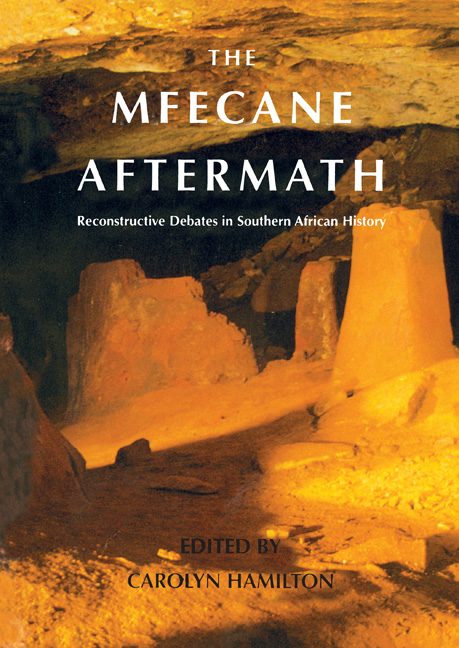Book contents
- Frontmatter
- Contents
- Maps
- Preface
- Acknowledgements
- Notes on Orthography and Names
- Contributors
- Introduction
- Part One Historiography and Methodology
- Putting the Mfecane Controversy into Historiographical Context
- 1 Pre-Cobbing Mfecane Historiography
- 2 Old Wine in New Bottles: The Persistence of Narrative Structures in the Historiography of the Mfecane and the Great Trek
- 3 Hunter-Gatherers, Traders and Slaves: The ‘Mfecane’ Impact on Bushmen, Their Ritual and Their Art
- 4 Language and Assassination: Cultural Negations in White Writers' Portrayal of Shaka and the Zulu
- Part Two The South-Eastern Coastal Region
- Part Three The Interior
- Glossary
- Abbreviations
- Bibliographer's Note
- Bibliography
- Complete List of Papers Presented at the Colloquium
- Index
Putting the Mfecane Controversy into Historiographical Context
from Part One - Historiography and Methodology
Published online by Cambridge University Press: 31 May 2019
- Frontmatter
- Contents
- Maps
- Preface
- Acknowledgements
- Notes on Orthography and Names
- Contributors
- Introduction
- Part One Historiography and Methodology
- Putting the Mfecane Controversy into Historiographical Context
- 1 Pre-Cobbing Mfecane Historiography
- 2 Old Wine in New Bottles: The Persistence of Narrative Structures in the Historiography of the Mfecane and the Great Trek
- 3 Hunter-Gatherers, Traders and Slaves: The ‘Mfecane’ Impact on Bushmen, Their Ritual and Their Art
- 4 Language and Assassination: Cultural Negations in White Writers' Portrayal of Shaka and the Zulu
- Part Two The South-Eastern Coastal Region
- Part Three The Interior
- Glossary
- Abbreviations
- Bibliographer's Note
- Bibliography
- Complete List of Papers Presented at the Colloquium
- Index
Summary
Julian Cobbing presents not one, but three arguments in his challenge to accepted versions of the mfecane:
Troubled times in southern Africa were not a consequence of the rise of the Zulu kingdom;
A continuous series of writers seeking to justify white settlement blamed the Zulu for devastating and depopulating vast territories;
The root causes of commotions in the first few decades of the nineteenth century were labour raiding and slaving expeditions mounted to feed demand generated in the Cape colony and Portuguese Mozambique.
The first argument has been widely accepted. The other two have provoked spirited controversy. Essays in Part One of this book take up some of the issues raised by the second and third of Cobbing's propositions.
Settler History and the Mfecane
Cobbing regards the mfecane as the masterpiece of settler history, and in so doing aligns himself with a long-standing tendency of South African scholarship to emphasise the political uses of history. Afrikaner nationalists have at various times advertised their intention to find a past that serves their cause. English-speaking historians such as the influential amateurs George McCall Theal and George Cory made clear their own intentions to write the sort of history that would ‘heal’ divisions between Boer and Briton. In various ways ‘liberal’ historians of the 1940s, 1950s and 1960s consciously wrote history ‘against apartheid’. Those scholars were in turn attacked by radicals for deliberately concealing the functional relationship between segregation and capitalism.
Against this background, Cobbing's assumption of a linkage between what he regards as mfecane theorists and settler interests amounts to a normal reflex action for a South African historian. That does not mean, however, that it deserves to be accepted without examination. It is a proposition that can be tested according to normal canons of historical proof.
Christopher Saunders sets out to do precisely that, and finds no evidence that a continuous chain of settler apologists stretches from Theal to John Omer-Cooper. Without at all denying that historians write in an ideological context, he points to marked contrasts in interpretations of the mfecane. He draws a sharp contrast between Theal and Cory, who traced all violence to Shaka, and William Macmillan, who strongly suspected that the slave trade to Mozambique had much to do with disruptions in what became the Zululand region, the highveld and even the eastern Cape frontier.
- Type
- Chapter
- Information
- Mfecane AftermathReconstructive Debates in Southern African History, pp. 13 - 20Publisher: Wits University PressPrint publication year: 1995



